Related Research Articles

Michio Kaku is an American physicist, science communicator, futurologist, and writer of popular-science. He is a professor of theoretical physics at the City College of New York and the CUNY Graduate Center. Kaku is the author of several books about physics and related topics and has made frequent appearances on radio, television, and film. He is also a regular contributor to his own blog, as well as other popular media outlets. For his efforts to bridge science and science fiction, he is a 2021 Sir Arthur Clarke Lifetime Achievement Awardee.

Jacob David Bekenstein was a Mexican-born American-Israeli theoretical physicist who made fundamental contributions to the foundation of black hole thermodynamics and to other aspects of the connections between information and gravitation.

Leonard Susskind is an American theoretical physicist, Professor of theoretical physics at Stanford University and founding director of the Stanford Institute for Theoretical Physics. His research interests are string theory, quantum field theory, quantum statistical mechanics and quantum cosmology. He is a member of the US National Academy of Sciences, and the American Academy of Arts and Sciences, an associate member of the faculty of Canada's Perimeter Institute for Theoretical Physics, and a distinguished professor of the Korea Institute for Advanced Study.

Ashoke Sen FRS is an Indian theoretical physicist and distinguished professor at the International Centre for Theoretical Sciences (ICTS), Bangalore. A former distinguished professor at the Harish-Chandra Research Institute, Allahabad, He is also an honorary fellow in National Institute of Science Education and Research (NISER) India he is also a Morningstar Visiting professor at MIT and a distinguished professor at the Korea Institute for Advanced Study. His main area of work is string theory. He was among the first recipients of the Breakthrough Prize in Fundamental Physics "for opening the path to the realization that all string theories are different limits of the same underlying theory".

Neil Geoffrey Turok is a South African physicist. He has held the Higgs Chair of Theoretical Physics at the University of Edinburgh since 2020, and has been director emeritus of the Perimeter Institute for Theoretical Physics since 2019. He specializes in mathematical physics and early-universe physics, including the cosmological constant and a cyclic model for the universe.
"They Saved Lisa's Brain" is the twenty-second and penultimate episode of the tenth season of the American animated television series The Simpsons. It first aired on Fox in the United States on May 9, 1999. In the episode, after writing a thoughtful letter to the Springfield Shopper, Lisa is invited to join the Springfield chapter of Mensa. When Mayor Quimby later flees Springfield, the group takes control of the town, hoping to improve the lives of Springfieldians through the rule of the smartest. Meanwhile, Homer poses for a series of erotic photos.

Dennis William Siahou Sciama, was an English physicist who, through his own work and that of his students, played a major role in developing British physics after the Second World War. He was the PhD supervisor to many famous physicists and astrophysicists, including John D. Barrow, David Deutsch, George F. R. Ellis, Stephen Hawking, Adrian Melott and Martin Rees, among others; he is considered one of the fathers of modern cosmology.

James Maxwell Bardeen was an American physicist, well known for his work in general relativity, particularly his role in formulating the laws of black hole mechanics. He also discovered the Bardeen vacuum, an exact solution of the Einstein field equation.
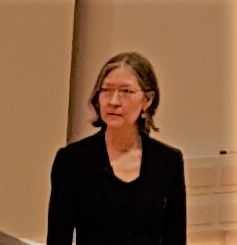
Helen Fay Dowker is a British physicist who is a current professor of theoretical physics at Imperial College London.
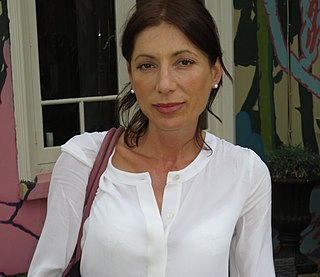
Laura Mersini-Houghton is an Albanian-American cosmologist and theoretical physicist, and professor at the University of North Carolina at Chapel Hill. She is a proponent of the multiverse hypothesis and the author of a theory for the origin of the universe that holds that our universe is one of many selected by quantum gravitational dynamics of matter and energy. Predictions of her theory have been successfully tested by astrophysical data.. She argues that anomalies in the current structure of the universe are best explained as the gravitational tug exerted by other universes.

Stephen Hawking (1942–2018), a theoretical physicist, has appeared in many works of popular culture.

Jameel Sadik "Jim" Al-Khalili is an Iraqi-British theoretical physicist and science populariser. He is professor of theoretical physics and chair in the public engagement in science at the University of Surrey. He is a regular broadcaster and presenter of science programmes on BBC radio and television, and a frequent commentator about science in other British media.

Hawking is a 2004 biographical drama television film directed by Philip Martin and written by Peter Moffat. Starring Benedict Cumberbatch, it chronicles Stephen Hawking's early years as a PhD student at the University of Cambridge, following his search for the beginning of time, and his struggle against motor neurons disease. It premiered in the UK in April 2004.

Stephen William Hawking was an English theoretical physicist, cosmologist, and author who was director of research at the Centre for Theoretical Cosmology at the University of Cambridge. Between 1979 and 2009, he was the Lucasian Professor of Mathematics at Cambridge, widely viewed as one of the most prestigious academic posts in the world.
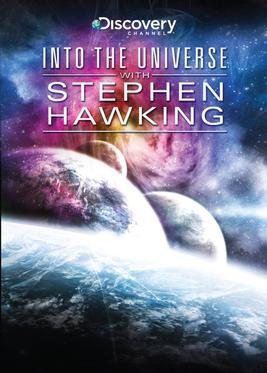
Into the Universe with Stephen Hawking is a 2010 science documentary television mini-series written by British physicist Stephen Hawking. The series was created for Discovery Channel by Darlow Smithson Productions and features computer generated imagery of the universe created by Red Vision. The series premiered on 25 April 2010 in the United States and started on 9 May 2010 in the United Kingdom with a modified title, Stephen Hawking's Universe.
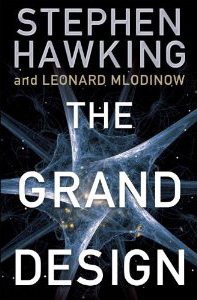
The Grand Design is a popular-science book written by physicists Stephen Hawking and Leonard Mlodinow and published by Bantam Books in 2010. The book examines the history of scientific knowledge about the universe and explains eleven-dimensional M-theory. The authors of the book point out that a Unified Field Theory may not exist.

Black Hole War: My Battle with Stephen Hawking to Make the World Safe for Quantum Mechanics is a 2008 popular science book by American theoretical physicist Leonard Susskind. The book covers the black hole information paradox, and the related scientific dispute between Stephen Hawking and Susskind. Susskind is known for his work on string theory and wrote a previous popular science book, The Cosmic Landscape, in 2005.
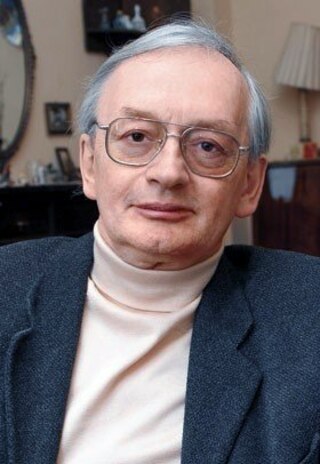
Alexei Alexandrovich Starobinsky was a Soviet and Russian theoretical physicist and cosmologist. He was a pioneer of the theory of cosmic inflation, for which he received the 2014 Kavli Prize in Astrophysics together with Alan Guth and Andrei Linde.
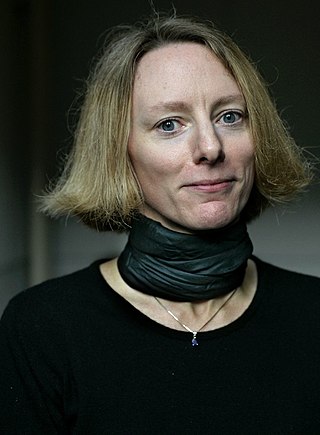
Marika Maxine Taylor is a Professor of Theoretical Physics, Pro-Vice Chancellor and Head of College of Engineering and Physical Sciences at the University of Birmingham. She started this role in September 2023 after being Head of School for Mathematics at the University of Southampton.
References
- 1 2 3 "Stephen Hawking: Master of the Universe". Channel 4. Retrieved 28 July 2012.
- ↑ Ferguson, Kitty (2012). Stephen Hawking: An Unfettered Mind. Macmillan. p. 146. ISBN 9781137000224.
- ↑ Hawking, Stephen (26 February 2008). "Prof Steven Hawking: A brief history of time". The Telegraph. Archived from the original on 19 August 2010. Retrieved 31 July 2012.
- ↑ Darren, David (4 March 2008). "Five off to a strong start with Breaking into Tesco". Brand Republic. Retrieved 28 July 2012.
- ↑ Farey-Jones, Daniel (11 March 2008). "The Fixer brings crime drama joy to ITV". Brand Republic. Retrieved 28 July 2012.
- ↑ Walton, James (4 March 2008). "Last night on television: Stephen Hawking: Master of the Universe". The Daily Telegraph. Retrieved 28 July 2012.
- ↑ Wakefield, Philip (1 December 2008). "Top 10 TV picks: December 2–8". Stuff (company). Retrieved 28 July 2012.
- ↑ Wollastan, San (3 March 2008). "Last night's TV: Stephen Hawking: Master of the Universe". The Guardian. Retrieved 28 July 2012.